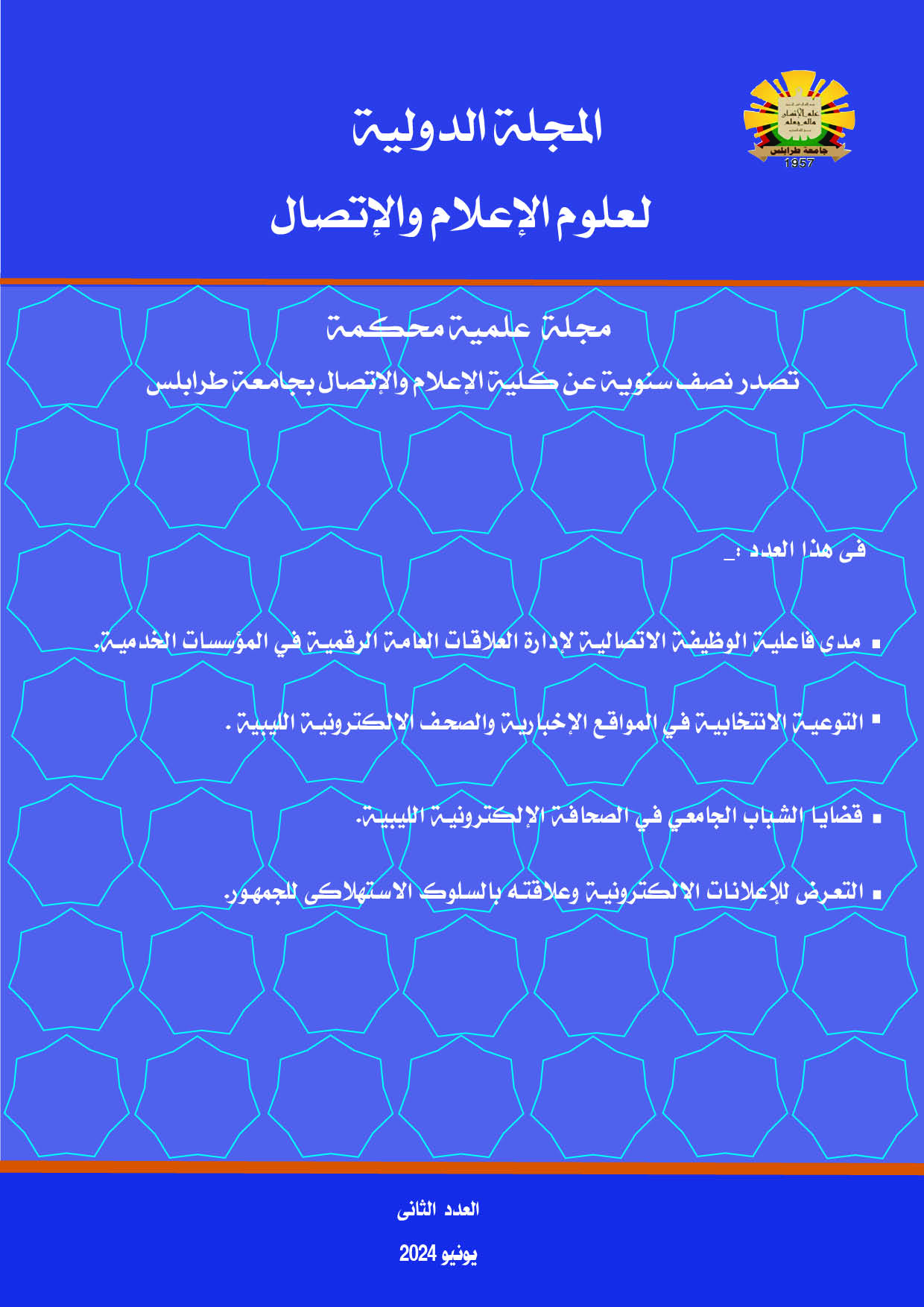قضايا الشباب الجامعي في الصحافة الإلكترونية الليبية
الملخص
ملخص الدراسة :
تحددت مشكلة هذه الدراسة في التعرف على دور الصحافة الإلكترونية الليبية في معالجة قضايا الشباب الليبي ومدى انعكاسات هذه المعالجة والتناول على المجتمع و الشباب على وجه الخصوص ، ونظراً لتذبذب وعدم انتظام صدور الصحافة الورقية ناهيك عن تدني مستوى توزيعها خلال فترة الدراسة الأمر الذي يحول دون الوصول من خلال دراستها إلى نتائج علمية دقيقة يمكن تعميمها ، فقد رأى الباحث إجراء هذه الدراسة التحليلية على عينة من الصحافة الإلكترونية التي تحظى بنسبة متابعة كبيرة نظراً لسهولة الإطلاع عليها .
وتلخصت أهداف الدراسة فيما يلي :
1- الكشف عن قضايا الشباب الجامعي التي عالجتها الصحافة الإلكترونية الليبية.
2- الكشف عن المصادر التي اعتمدت عليها الصحافة الإلكترونية الليبية في معالجتها لقضايا
الشباب الجامعي الليبي.
3- التعرف على اتجاه المادة الصحفية في الصحافة الإلكترونية الليبية تجاه قضايا الشباب
الجامعي الليبي.
4- التعرف على وظيفة المادة الصحفية في الصحافة الإلكترونية الليبية في معالجتها لقضايا
الشباب الجامعي الليبي.
وتوصلت الدراسة إلى جملة من النتائج حول دور الصحافة في معالجة قضايا الشباب الجامعي نلخصها فيما يلي :-
- ضعف دور الصحافة في تكوين الوعي السياسي للشباب (عينة الدراسة) وهو ما يتوافق مع تدني معدل حجم اعتماد الشباب على الصحافة كمصدر للمعلومات وذلك بنسبة (36% ) وأظهرت نتائج التحليل بأنه لا توجد علاقة دالة إحصائيا بين معدل اعتماد الشباب الجامعي الليبي على الصحافة كمصدر للمعلومات السياسية وحجم مشاركتهم السياسية وكذلك مستوى معرفتهم السياسية.
- ليس ثمة علاقة بين معدل اعتماد الشباب الجامعي الليبي على الصحافة كمصدر للمعلومات السياسية ومدى اهتمامهم بمطالعة الموضوعات والقضايا السياسية.
- ليس هناك علاقة تربط بين معدل تعرض الشباب الجامعي الليبي للصحف وحصولهم على بطاقات الانتخاب.
- لا توجد علاقة تربط بين معدل تعرض الشباب الجامعي الليبي للصحافة ومعدل المشاركة في العملية الانتخابية.
An Introduction :
Youth issues in general and university youth in particular are among the most important societal issues that affect a large segment of Libyan society and touch the lives of all its members directly or indirectly. There is hardly a family in Libyan society that is devoid of one or more young men or women among its members who fall under The university education sector is therefore concerned with the issues of this category and constitute part of its interests. Therefore, it was necessary for the media, including the electronic press, to play a prominent role in raising awareness of the issues of Libyan youth. Through reviewing a number of previous studies in this field, the researcher noted that the media and electronic journalism are among the most important cultural institutions influencing public opinion trends, which can play important roles in addressing youth issues, both positively and negatively.
The Study Problem :
What is meant by defining the problem of the study is to narrow the boundaries of the topic so that it is limited to what the researcher wants to address, and not to what the title suggests of topics that the researcher does not want to address. The problem of this study was identified in identifying the role of the Libyan electronic press in addressing the issues of Libyan youth and the extent of the repercussions of this treatment and treatment on society and youth in particular, and given the fluctuation and irregularity of the issuance of the print press, not to mention the low level of its distribution during the study period, which prevents access to During its study, it produced accurate scientific results that could be generalized. The researcher decided to conduct this analytical study on a sample of the electronic press, which has a large following due to its ease of access.
The objectives of the study were summarized as follows:
1- Revealing university youth issues that were addressed by the Libyan electronic press. 2- Disclosing the sources that the Libyan electronic press relied on in dealing with issues Libyan university youth. 3- Identifying the trend of journalistic material in the Libyan electronic press towards youth issues Libyan university. 4- Identify the function of journalistic material in the Libyan electronic press in dealing with issues Libyan university youth. The study reached a number of results about the role of the press in addressing university youth issues, which we summarize as follows: 1. The weak role of the press in forming the political awareness of young people (study sample), which corresponds to the low rate of dependence of young people on the press as a source of information, at a rate of (36%). The results of the analysis showed that there is no statistically significant relationship between the rate of dependence of Libyan university youth on the press. As a source of political information, the extent of their political participation, as well as their level of political knowledge. 2. There is no relationship between the rate of Libyan university youth’s reliance on the press as a source of political information and the extent of their interest in reading political topics and issues. 3. There is no relationship between the rate of exposure of Libyan university youth to newspapers and their obtaining voting cards. 4. There is no relationship between the rate of exposure of Libyan university youth to the press and the rate of participation in the electoral process.

